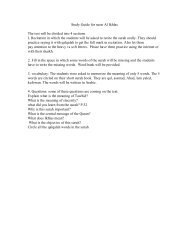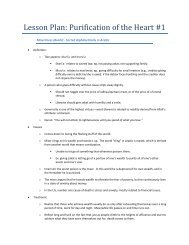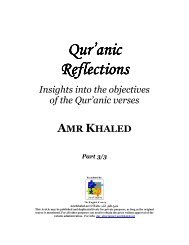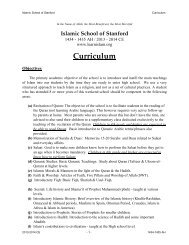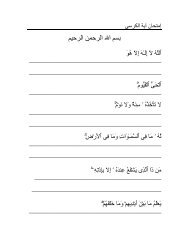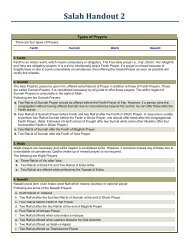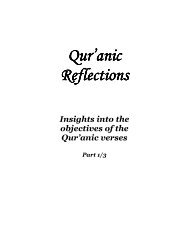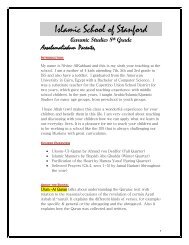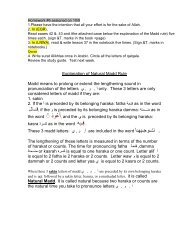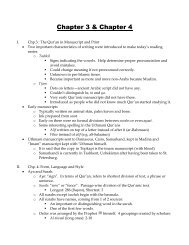Quranic Reflections - Islamic School of Stanford
Quranic Reflections - Islamic School of Stanford
Quranic Reflections - Islamic School of Stanford
You also want an ePaper? Increase the reach of your titles
YUMPU automatically turns print PDFs into web optimized ePapers that Google loves.
Surat Ash-Shu’ara (The Poets)<br />
This Surah is Makkan. It was revealed after Surat Al-Waqi-ah, and it comes after<br />
Surat Al-Furqan in the order <strong>of</strong> the Qur’an. The number <strong>of</strong> its Ayahs is 227.<br />
Narrate on my behalf even one ayah<br />
Surat Ash-Shu’ara is about the importance <strong>of</strong> conveying the message to people<br />
through the best effective means. In the time <strong>of</strong> Prophet Musa (Moses), the means was<br />
magic, and at the age <strong>of</strong> Prophet Mohammad (SAWS), it was poetry and poets (hence<br />
comes the name <strong>of</strong> the Surah).<br />
This Surah was revealed in a time when the Muslims needed to learn the methods <strong>of</strong><br />
information and communication. The beginning <strong>of</strong> the public preaching <strong>of</strong> the<br />
message <strong>of</strong> Islam had then begun. The Prophet (SAWS) stood on Al-Safa Mountain<br />
and announced that the call to Islam had to be done publicly for the first time in<br />
Makkah. In this way, the Surah shows clearly the importance <strong>of</strong> the means <strong>of</strong><br />
communication and information in the process <strong>of</strong> Da’wa (Calling to Allah and Islam).<br />
The danger <strong>of</strong> audible speech<br />
Media is a double-edged sword. It is used either to mislead people or to guide them.<br />
For this reason, Allah (SWT) ended the Surah saying what can be translated as: “As<br />
for the poets, the erring ones follow them, See you not that they speak about<br />
every subject (praising people - right or wrong) in their poetry And that they<br />
say what they do not do. Except those who believe (in the Oneness <strong>of</strong> Allah -<br />
<strong>Islamic</strong> Monotheism) and do righteous deeds, and remember Allah much, and<br />
vindicate themselves after they have been wronged (by replying back in poetry to<br />
the unjust poetry (which the pagan poets utter against the Muslims)). And those<br />
who do wrong will come to know by what overturning they will be<br />
overturned”(TMQ, 26:224-227).<br />
Poets in the time <strong>of</strong> Prophet (SAWS) or Media in our current time may mislead people<br />
and prevent them from worshipping Allah (SWT). On the other hand, they may give<br />
people the right information about religion and hence guide them to righteousness.<br />
Therefore, preachers to Allah’s (SWT) way should use these means, the role <strong>of</strong> which<br />
grows in our age.<br />
Keys <strong>of</strong> the hearts<br />
As we have seen before, the Prophets’ (SAWS) stories come in a Surah to serve its<br />
objective. When the Surah spoke about Prophet Musa (AS), it stated how he had<br />
feared his words might not produce the desired impact on his people. He said “And<br />
my breast straitens, and my tongue expresses not well. So send for Harun<br />
(Aaron) (to come along with me)”. (TMQ, 26:13). All Prophets (SAWS) stories that<br />
came in the Surah were focusing on the dialogue <strong>of</strong> the Prophet (SAWS) with his<br />
people. This is what we find in the stories <strong>of</strong> Musa (AS), Ibrahim (Abraham) (AS),<br />
Noah (AS), Hud (AS), Saleh (AS), Loot (AS) and Shu’aib (AS). We find the focus on<br />
“he said and they said”. The style <strong>of</strong> the dialogues in the Surah is wonderful. It<br />
prepares the Prophet (SAWS) to begin the stage <strong>of</strong> public preaching, which was



